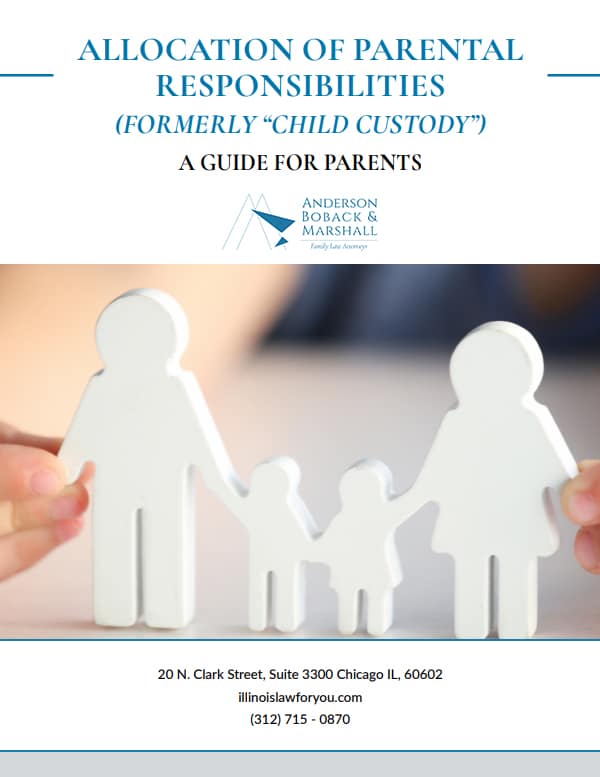The legal term “best interests” is a concept that comes up in almost all child-related areas of family law. When making essentially any decision on behalf of a child, the court is going to look at what is best for that child and allow that to guide their rulings. Some issues, like the idea that all parents should provide financial support for their children, are bright-line best interests concepts that have only one interpretation.
There really isn’t anyone who would argue that a child doesn’t benefit from financial support from both of their parents. However, many child-related decisions are not so clear and straightforward, which is where the idea of “best interests” really comes into play in custody cases when trying to figure out how to divide up parenting time and decision-making between the parents.
Ideally, both parents will be equally involved in the child’s life—that is the standard under Illinois law and the preference of the judges. However, realistically, not all parents are fit to have equal parenting time or equal decision-making authority, and that is when best interests often come into consideration when deciding how to divide up the parents’ time and authority for the children.
What are the Best Interest Factors?
There are a variety of factors that are taking into consideration when determining the best interests on the child, and those factors difference based on whether the judge is allocating parenting time and decision-making authority.
Best Interest Factors for Decision-Making Responsibilities
Here are the best interests factors that can be considered for decision-making responsibilities under Illinois law:
- the wishes of the child, taking into account the child’s maturity and ability to express reasoned and independent preferences as to decision-making;
- the child’s adjustment to his or her home, school, and community;
- the mental and physical health of all individuals involved;
- the ability of the parents to cooperate to make decisions, or the level of conflict between the parties that may affect their ability to share decision-making;
- the level of each parent’s participation in past significant decision-making with respect to the child;
- any prior agreement or course of conduct between the parents relating to decision-making with respect to the child;
- the wishes of the parents;
- the child’s needs;
- the distance between the parents’ residences, the cost and difficulty of transporting the child, each parent’s and the child’s daily schedules, and the ability of the parents to cooperate in the arrangement;
- whether a restriction on decision-making is appropriate under Section 603.10;
- the willingness and ability of each parent to facilitate and encourage a close and continuing relationship between the other parent and the child;
- the physical violence or threat of physical violence by the child’s parent directed against the child;
- the occurrence of abuse against the child or other member of the child’s household;
- whether one of the parents is a sex offender, and if so, the exact nature of the offense and what, if any, treatment in which the parent has successfully participated; and
- any other factor that the court expressly finds to be relevant.
Best Interest Factors for Allocation of Parenting Time
In Illinois, the best interests factors that the court can consider for the allocation of parenting time:
- the wishes of each parent seeking parenting time;
- the wishes of the child, taking into account the child’s maturity and ability to express reasoned and independent preferences as to parenting time;
- the amount of time each parent spent performing caretaking functions with respect to the child in the 24 months preceding the filing of any petition for allocation of parental responsibilities or, if the child is under 2 years of age, since the child’s birth;
- any prior agreement or course of conduct between the parents relating to caretaking functions with respect to the child;
- the interaction and interrelationship of the child with his or her parents and siblings and with any other person who may significantly affect the child’s best interests;
- the child’s adjustment to his or her home, school, and community;
- the mental and physical health of all individuals involved;
- the child’s needs;
- the distance between the parents’ residences, the cost and difficulty of transporting the child, each parent’s and the child’s daily schedules, and the ability of the parents to cooperate in the arrangement;
- whether a restriction on parenting time is appropriate;
- the physical violence or threat of physical violence by the child’s parent directed against the child or other member of the child’s household;
- the willingness and ability of each parent to place the needs of the child ahead of his or her own needs;
- the willingness and ability of each parent to facilitate and encourage a close and continuing relationship between the other parent and the child;
- the occurrence of abuse against the child or other member of the child’s household;
- whether one of the parents is a convicted sex offender or lives with a convicted sex offender and, if so, the exact nature of the offense and what if any treatment the offender has successfully participated in; the parties are entitled to a hearing on the issues raised in this paragraph (15);
- the terms of a parent’s military family-care plan that a parent must complete before deployment if a parent is a member of the United States Armed Forces who is being deployed; and
- any other factor that the court expressly finds to be relevant.
How Do You Show Best Interests of the Child?
For both issues, best interests can be proven through evidence and testimony. Evidence can include all kinds of written communications and documents, as well as photos, videos, and the like. It can include the parents’ testimony as well as the testimony of experts like a Guardian ad Litem, therapists, doctors, and parenting evaluators, all of whom can provide information and opinions about the parents’ individual relationship with the child and whether there are concerns about the child spending time with one parent or allowing that parent to make decisions for the child.
In some cases, evidence will show concerns for the child’s safety in the care of one parent, which is an issue that often comes into place when there are allegations of substance abuse, abuse, neglect, untreated mental illness, and so on. In these situations, the court may find that the parent is unable to safely care for the child and place restrictions on the parent’s parenting time and decision-making for the child to protect the child from emotional or physical harm.
A best interests determination could also directly involve the child, though most parents, attorneys, and judges try to keep the children out of the litigation. However, in some instances the judge may feel compelled to speak with the child directly to get their opinions and input on their relationship with each parent.
This is increasingly likely with older children, as they are deemed to have greater authority with the court in where they live and how much time they spend with each parent.
Who Determines the Best Interests of the Child?
The simple answer is that the judge determines what is in the best interests of the child, as the judge enters the order allocating parenting time and decision-making. However, the judge’s decision can be heavily influenced (though not always) by the opinions and findings of experts, like therapists and parenting evaluators.
Judges often rely on those who have worked directly with the family but maintain the position of being a neutral third party, when making decisions about what is best for a child.
What is Not in the Best Interests of the Child?
First and foremost, it is not in the best interests of a child to be put into a situation where the child could suffer harm, abuse, or neglect due to the parent’s actions. Parents are expected to protect their children from exposure to or risk of harm.
When they fail to do that, whether on purpose through abuse or inadvertently through negligence, they stand to lose time with and responsibility for their child even if the child is not injured.
Likewise, failure to provide for a child’s basic needs like food, clothing, shelter, medical care, an education, and the like are considered to not be in a child’s best interests. If a parent fails to provide or facilitate these resources, they are generally as not acting in the child’s best interests.
Interactions Between a Child’s Parents
But perhaps the most common issue that comes up in family law cases when dealing with the issue of best interests is the parents’ interactions with each other regarding their children directly to their children.
Parents who actively interfere with or discourage the child from having a healthy, loving relationship with the other parent, either by not allowing them to communicate or have time together or perhaps by disrespecting and disparaging the other parent in front of the child, are often considered to be engaging in alienation. This is severely looked down upon by judges.
In some situations, if a parent heavily interferes with the other parent’s time and communications with the child(ren), the court may decide to award majority parenting time and decision-making to the other parents in recognition of the harm caused to a child when they are prevented from having a relationship with both parents.
Unless the parents is actively abusive or a danger to the child, parents should be careful about placing limits or restrictions on the child’s ability to maintain a positive relationship with both parents, as that is considered one of the fundamental best interests of all children.
Understanding the Best Interest Factors in Your Child’s Situation
It is important to review these factors and outline how they can assist or harm you in your argument for parenting time and decision-making. It is also important to be honest regarding your position on each factor and what can assist or harm you if you are working with an attorney.
When it comes to matters of child custody or the allocation of parental responsibilities or parenting time, it is important to seek advice and input from an experienced, trusted child custody lawyer in Chicago. Contact Anderson Boback & Marshall today when you’re faced with questions about the Illinois best interest factors for your child(ren).















